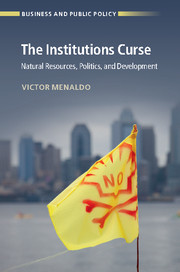Book contents
- Frontmatter
- Dedication
- Contents
- List of figures
- List of maps
- List of tables
- Acknowledgments
- 1 Introduction
- 2 Three puzzles and some building blocks
- 3 Intellectual heritage of the institutions curse view
- 4 The institutions curse theory
- 5 Not manna from heaven after all: the endogeneity of oil
- 6 The resource blessing
- 7 Oil curse or monarchical exceptionalism?
- 8 Conclusions
- References
- Author index
- Subject index
6 - The resource blessing
Published online by Cambridge University Press: 05 August 2016
- Frontmatter
- Dedication
- Contents
- List of figures
- List of maps
- List of tables
- Acknowledgments
- 1 Introduction
- 2 Three puzzles and some building blocks
- 3 Intellectual heritage of the institutions curse view
- 4 The institutions curse theory
- 5 Not manna from heaven after all: the endogeneity of oil
- 6 The resource blessing
- 7 Oil curse or monarchical exceptionalism?
- 8 Conclusions
- References
- Author index
- Subject index
Summary
If one looks back at world history, resource blessings seem to abound. This includes both the distant and more recent past. Let us consider some illuminating anecdotes.
Mining has always been an important, yet rarely remarked upon, engine of Sweden's economy. Sweden's public education system has always been characterized by aggressive government involvement in research and development centered on the natural sciences. This agenda has been driven by the country's natural resource industries, including mining and forestry, which have required advanced technical training, especially in engineering. Public investments in vocational training have driven innovation, first in the natural resource sector itself, and later in telecommunications and information technology. These spillovers have helped create a highly skilled workforce that enjoys some of the highest living standards in the world, while living in one of the world's most celebrated social democracies.
This phenomenon was itself a product of the Swedish state's explicit attempt, as early as the fifteenth century, to promote mining in a bid to enhance its military and economic power. This strategy was wildly successful, as advances in the extraction and smelting of copper ore allowed Scandinavia's most celebrated monarch, Gustavus Adolphus, to amass a vast empire and enrich his kingdom.
Similarly, developing countries such as Indonesia, Malaysia, Zambia, Chile, and Peru have grown steadily throughout the 2000s on the back of spectacular natural resource booms. More impressively, they have also weathered a few sizable price declines in their exportable commodities since the dawn of the millennium. Indeed, they have often grown at rates above their regional averages during these “price corrections,” the most recent of which began in 2014.
This is for two main reasons: first, because these countries have adopted countercyclical fiscal policies in which they save windfalls accrued during boom times and drawn down on their stashed natural resource revenues during bad times. Second, because they have successfully diversified their economies, nurtured their agricultural sectors, and invested heavily in education and healthcare. This is perhaps because these countries all belong to the world's “democracy club”; indeed, they have been members in good standing for quite some time now.
Even so-called petro states are no longer all that reliant on natural resources, despite reaping the benefits of recent price booms. In Sub-Saharan Africa, this includes Angola and Chad. In the Middle East, this includes glitzy Gulf States.
- Type
- Chapter
- Information
- The Institutions CurseNatural Resources, Politics, and Development, pp. 237 - 294Publisher: Cambridge University PressPrint publication year: 2016

